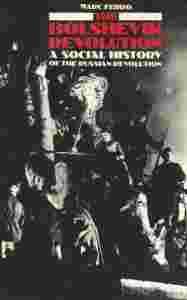|
____________
Translated by Norman Stone
Wydawnictwo Routledge & Kegan Paul. London 1985
First published in French as "La Revolution de 1917: Octobre, naissance d'une societe" (Paris, 1976)
Stron 368
Wymiary: 23 x 15,5 cm
Książka w języku angielskim
Książka bez podkreśleń w tekście
____________
|
DARMOWA WYSYŁKA W POLSCE PRZY JEDNORAZOWYM ZAKUPIE NA MINIMUM 7 AUKCJACH !!!
(z wyjątkiem przedmiotów o wartości mniejszej niż 2,50 zł)
ZOBACZ POZOSTAŁE AUKCJE !!!
ZAKUP NA KILKU AUKCJACH - JEDEN KOSZT WYSYŁKI (jak przy aukcji, na której jest on najwyższy).
OPCJE WPŁATY:
1) PayU - najsprawniej i najbezpieczniej (kartą Visa, Master Card lub e-przelewem),
2) Na konto bankowe
WYSYŁKA INPOST, EWENTUALNIE DO MNIEJSZYCH MIEJSCOWOŚCI POCZTA POLSKA.
International customers
SHIPPING WORLDWIDE
|
| Marc Ferro (born 1924 in Paris) is a French historian. He has worked on early twentieth-century European history, specialising in the history of Russia and the USSR, as well as the history of cinema.
He is Director of Studies in Social Sciences at the École des hautes études en sciences sociales. He is a co-director of the French review Annales and co-editor of the Journal of Contemporary History.
He has also directed and presented television documentaries on the rise of the Nazis, Lenin and the Russian revolution and on the representation of history in cinema.
The Annales School (French pronunciation: [annal]) is a group of historians associated with a style of historiography developed by French historians in the 20th century to stress long-term social history. It is named after its scholarly journal Annales d'histoire économique et sociale, which remains the main source of scholarship, along with many books and monographs.[1] The school has been highly influential in setting the agenda for historiography in France and numerous other countries, especially regarding the use of social scientific methods by historians, emphasizing social rather than political or diplomatic themes, and for being generally hostile to the class analysis of Marxist historiography.
The school deals primarily with late medieval and early modern Europe (before the French Revolution), with little interest in later topics. It has dominated French social history and influenced historiography in Europe and Latin America. Prominent leaders include co-founders Lucien Febvre (1878–1956) and Marc Bloch (1886–1944). The second generation was led by Fernand Braudel (1902–1985) and included Georges Duby (1919–1996), Pierre Goubert (1915–2012), Robert Mandrou (1921–1984), Pierre Chaunu (1923–2009), Jacques Le Goff (1924– ), and Ernest Labrousse (1895–1988). Institutionally it is based on the Annales journal, the SEVPEN publishing house, the Fondation Maison des sciences de l'homme (FMSH), and especially the 6th Section of the École pratique des hautes études, all based in Paris. A third generation was led by Emmanuel Le Roy Ladurie (1929– ) and includes Jacques Revel,[2] and Philippe Ariès (1914–1984), who joined the group in 1978. The third generation stressed history from the point of view of mentalities, or mentalités. The fourth generation of Annales historians, led by Roger Chartier (1945– ), clearly distanced itself from the mentalities approach, replaced by the cultural and linguistic turn, which emphasize analysis of the social history of cultural practices.
The main scholarly outlet has been the journal Annales d'Histoire Economique et Sociale ("Annals of economic and social history"), founded in 1929 by Lucien Febvre and Marc Bloch, which broke radically with traditional historiography by insisting on the importance of taking all levels of society into consideration and emphasized the collective nature of mentalities. Its contributors viewed events as less fundamental than the mental frameworks that shaped decisions and practices.
Braudel was editor of Annales from 1956 to 1968, followed by the medievalist Jacques Le Goff. However, Braudel's informal successor as head of the school was Le Roy Ladurie. Noting the political upheavals in Europe and especially in France in 1968, Eric Hobsbawm argues that "in France the virtual hegemony of Braudelian history and the Annales came to an end after 1968, and the international influence of the journal dropped steeply."[3] Multiple responses were attempted by the school. Scholars moved in multiple directions, covering in disconnected fashion the social, economic, and cultural history of different eras and different parts of the globe. By the time of crisis the school was building a vast publishing and research network reaching across France, Europe, and the rest of the world. Influence indeed spread out from Paris, but few new ideas came in. Much emphasis was given to quantitative data, seen as the key to unlocking all of social history.[4] However, the Annales ignored the developments in quantitative studies underway in the U.S. and Britain, which reshaped economic, political and demographic research.[5] An attempt to require an Annales-written textbook for French schools was rejected by the government.[6] By 1980 postmodern sensibilities undercut confidence in overarching metanarratives. As Jacques Revel notes, the success of the Annales School, especially its use of social structures as explanatory forces contained the seeds of its own downfall, for there is "no longer any implicit consensus on which to base the unity of the social, identified with the real."[7] The Annales School kept its infrastructure, but lost its mentalités.[8]
|
|

